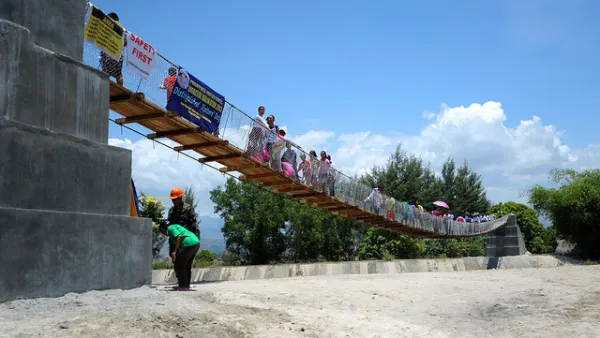The nation of Iraq is building itself anew after the last of the US troops evacuated six months ago, but experts are saying that their wealth, which has created an invasion of shopping malls around the country, is subsidizing the public agenda.
Oil production has given the country a surplus of wealth, but the country's private sector continues to suffer from malnourishment. Instead of financing new businesses and supporting the build-out of a private sector, which is virtually non-existent in the country, the accumulation of wealth has been given the task of financing the government work force, which currently employs about one-third of the nation's population. Another beneficiary of this increased revenue? Super malls. "'Basically, Iraq is trying to build a consumer society, not on state capitalism like in China, but on socialism,' said Marie-Hélène Bricknell, the World Bank's representative in Iraq."
"Given the statist mentality of most top Iraqi officials and widespread corruption," writes Arango, "diplomats are generally pessimistic that the expected boom in government revenues will be used either to help develop a private sector or to pay for an ambitious public works program - something the country, where 40 percent of the population still lacks access to safe drinking water, desperately needs. Instead, experts worry it will finance more of what Iraq already has: corruption and a huge government work force."
This increasingly skewed spread of wealth essentially robs the nation from the ability to support itself, by not providing basic needs and services or nourishing a self-sustaining working class. "Building a consumer society on top of nothing is like building a bubble that will burst in the future," Ms. Bricknell said. With the shopping malls, she said, "you are putting a veneer over a rotting core, basically."
Arango, sensing a storm brewing ahead, is not optimistic for future conditions in Iraq, and claims that history may be repeating itself. "In 'The Modern History of Iraq,' he writes, "the American historian Phebe Marr described a similar trajectory in the 1970s when, she wrote, 'the era of prosperity rapidly created a consumer society dependent on government employment.'"
FULL STORY: Oil Wealth Returning, Iraq Sees Malls Rise

Analysis: Cybertruck Fatality Rate Far Exceeds That of Ford Pinto
The Tesla Cybertruck was recalled seven times last year.

National Parks Layoffs Will Cause Communities to Lose Billions
Thousands of essential park workers were laid off this week, just before the busy spring break season.

Retro-silient?: America’s First “Eco-burb,” The Woodlands Turns 50
A master-planned community north of Houston offers lessons on green infrastructure and resilient design, but falls short of its founder’s lofty affordability and walkability goals.

Test News Post 1
This is a summary

Analysis: Cybertruck Fatality Rate Far Exceeds That of Ford Pinto
The Tesla Cybertruck was recalled seven times last year.

Test News Headline 46
Test for the image on the front page.
Urban Design for Planners 1: Software Tools
This six-course series explores essential urban design concepts using open source software and equips planners with the tools they need to participate fully in the urban design process.
Planning for Universal Design
Learn the tools for implementing Universal Design in planning regulations.
EMC Planning Group, Inc.
Planetizen
Planetizen
Mpact (formerly Rail~Volution)
Great Falls Development Authority, Inc.
HUDs Office of Policy Development and Research
NYU Wagner Graduate School of Public Service




























